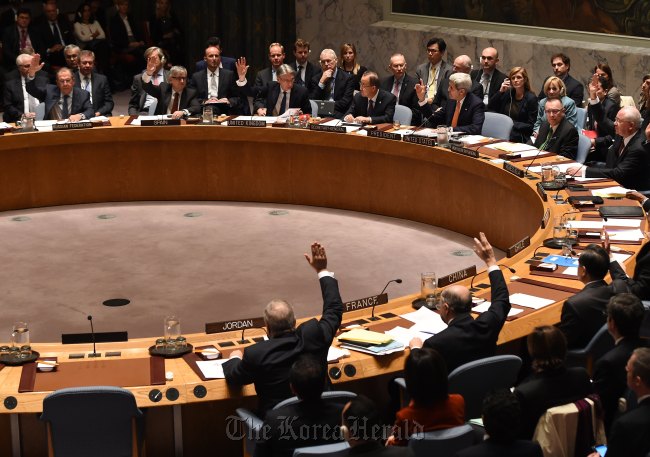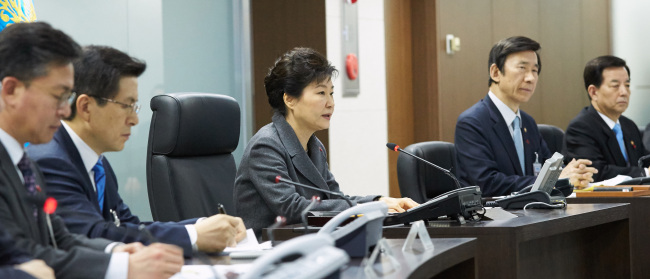In the aftermath of its fourth nuclear test on Wednesday, North Korea faces a fresh set of crippling international sanctions, with the U.N. Security Council set to gather in New York.
The U.S., China, Japan and other countries swiftly joined in condemning Pyongyang after it claimed to have successfully carried out its first hydrogen bomb experiment, “proudly joining the advanced ranks of nuclear weapons states possessing even H-bombs.”
The council is scheduled to meet at 1 a.m. Thursday in line with a “trigger” clause, which forces an automatic gathering to pave the way for a quicker resolution and sanctions, enshrined in the resolution imposed after the communist state’s third underground test in February 2013.
The U.S., China, Japan and other countries swiftly joined in condemning Pyongyang after it claimed to have successfully carried out its first hydrogen bomb experiment, “proudly joining the advanced ranks of nuclear weapons states possessing even H-bombs.”
The council is scheduled to meet at 1 a.m. Thursday in line with a “trigger” clause, which forces an automatic gathering to pave the way for a quicker resolution and sanctions, enshrined in the resolution imposed after the communist state’s third underground test in February 2013.

President Park Geun-hye also called for the council to come up with “strong sanctions” and the U.S. and other friendly countries to take stern measures against Pyongyang, saying it should “pay the price” for the provocation.
Following the third round of tests, the council approved tighter cargo inspections on airplanes and ships, and bans on lavish items such as pricey jewelry, yachts and race cars, while adding three key individuals, one business and one organization to its blacklist for asset freezes and travel bans.
The focal point for the anticipated new measures is whether the council will agree to “secondary boycott” sanctions, which enable penalties for non-North Korean companies and individuals engaged in transactions with the Kim Jong-un regime. The U.S. Congress, which had enforced similar bans against Iran, has pushed for such actions, though it failed to put it into legislation.
Given the North’s own assertion and the detected seismic activities, China and Russia, its traditional patrons with veto power, would inevitably accede to mounting calls for stricter punishment.
Beijing said it will summon North Korean Ambassador Ji Jae-ryong to lodge a complaint against the provocation.
“We strongly urge the North Korean side to remain committed to its commitment of denuclearization and stop taking any actions that will make the situation worse,” China’s Foreign Ministry spokeswoman Hua Chunying said at a news briefing.
Though it said it is aware of the seismic activity and is unable at this point to confirm the validity of the H-bomb blast, Washington denounced any violation of U.N. sanctions by Pyongyang.
“While we cannot confirm the claims at this time, we condemn any violation of UNSC resolutions and again call on North Korea to abide by its international obligations and commitments,” White House National Security Council spokesperson Ned Price said.
“We have consistently made clear that we will not accept it as a nuclear state. We will continue to protect and defend our allies in the region, including the Republic of Korea, and will respond appropriately to any and all North Korean provocations.”
Japanese Prime Minister Shinzo Abe lashed out at the Kim regime, saying the experiment poses a “grave challenge” to the country’s safety and global nonproliferation efforts. “(The test) is a serious threat to the safety of our nation and we absolutely cannot tolerate this.”
British Foreign Secretary Philip Hammond portrayed the event on Twitter as a “provocation” and “grave breach” of UNSC resolutions that he would “condemn without reservation.”

The Comprehensive Nuclear-Test-Ban Treaty Organization said it also spotted an “unusual seismic event” in a location “very similar” to where the third explosion took place, adding its experts are analyzing the occasion to establish more about its nature.
“If confirmed as a nuclear test, this act constitutes a breach of the universally accepted norm against nuclear testing; a norm that has been respected by 183 countries since 1996. It is also a grave threat to international peace and security,” Lassina Zerbo, executive secretary of the institution’s preparatory commission, said in a statement.
“I strongly urge #DPRK to observe the moratorium on #nuclear testing & join the 183 States Signatories who have signed the #CTBT,” Zerbo tweeted in a follow-up statement.
The Human Rights Watch also lambasted the provocation, citing that its timing coincided with the young leader’s birthday, urging the international community to hold him accountable for the ongoing brutalities against the people.
“Kim Jong-un may think it appropriate to celebrate his birthday with a nuclear test, but even a hydrogen bomb should not cause the world to forget that the Kim family’s hereditary dictatorship is built on the systematic brutalization and abuse of the North Korean people,” said Phil Robertson, deputy Asia director of the organization.
“The only birthday present that Kim Jong-un should get from the international community is a one-way trip to the International Criminal Court in The Hague, where he should be put on trial for crimes against humanity.”
By Shin Hyon-hee (heeshin@heraldcorp.com)









![[Up close in Yeouido] Trump hinting at US troop removal in South Korea ‘election-time talk’](http://res.heraldm.com/phpwas/restmb_idxmake.php?idx=644&simg=/content/image/2024/05/21/20240521050695_0.jpg&u=20240522173622)








